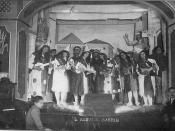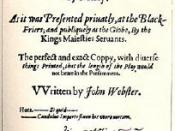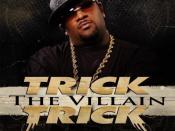Role of Bosola
Bosola can be described as a convincing character as unlike some of the characters in the play, his opinions and principles change throughout, therefore constantly altering the audience's feelings about him. He is the only character to communicate to the audience via soliloquy, divulging his true thoughts and intentions which often differ from his outward appearance, making him psychologically realistic and interesting. Although this would suggest he is a convincing character, Bosola, at times, falls into set roles of the Jacobean Tragedy; malcontent, satirist and avenger. Webster uses Bosola to fulfill these conventions of the genre and to direct and drive the plot, especially after the Duchess' death. Even though Webster uses Bosola in this way, he ismore than a mere tool as his character extends beyond the established roles of the genre, giving a more complete character.
Bosola is low-born, and therefore entirely dependent for material success on the patronage of his social betters.
His role thus contributes significantly to an important aspect of the play: its examination of class relations in a highly stratified society. Bosola's wit and satirical edge are throughout the play levelled at a patronage system that rewards toadying rather than merit. Yet the play makes clear the invidious position he is in.
Bosola is torn between an acute awareness of the social and moral deficiencies of the patronage system and a longing for social advancement that binds him to it. His vision of himself as a horse-leech, greedily sucking the brothers' blood until he drops off, captures something of this doubleness: he may despise the yes-men who thrive in the courtly milieu, but at the same time he wants to share in the material prosperity they enjoy.
Bosola is cetainly a complex character painted in The Duchess of Malfi by john...


